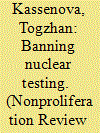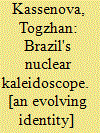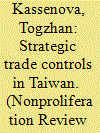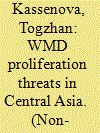| Srl | Item |
| 1 |
ID:
152058


|
|
|
|
|
| Summary/Abstract |
In the late 1940s, the Soviet Union rushed to build and test its first nuclear bomb to reach parity with the United States. The Soviet government chose the steppes of Kazakhstan as its first nuclear-testing site. In difficult conditions, weapons program participants built the site and, in 1949, tested the first Soviet nuclear bomb. Shrouded in secrecy, the Soviet military complex continued to conduct nuclear tests in Kazakhstan for forty years while the local population became an unwilling victim of the Soviet nuclear might. Nuclear tests, especially during the earlier years of atmospheric testing, resulted in severe health and environmental consequences for thousands of nearby residents. Mass protests in Kazakhstan against nuclear tests built the momentum that drove the Kazakh government's decision to close down the Semipalatinsk nuclear-testing site in 1989. Organized public movement against nuclear testing became an important part of Kazakhstan’s nation-building process. Since closing down the site, Kazakhstan has prioritized nuclear disarmament and nonproliferation, using its tragic nuclear past as a platform for making meaningful contributions to international security. Kazakhstan now offers the former nuclear-test site at Semipalatinsk for exercises designed to strengthen the verification capacity of the Comprehensive Nuclear-Test-Ban Treaty (CTBT). The country also plays a leading role in promoting CTBT entry into force.
|
|
|
|
|
|
|
|
|
|
|
|
|
|
|
|
| 2 |
ID:
132952


|
|
|
|
|
| Publication |
Washington, DC, Carnegie Endowment for International Peace, 2014.
|
| Description |
xii, 110p.Pbk
|
|
|
|
|
|
|
|
|
|
|
|
Copies: C:1/I:0,R:0,Q:0
Circulation
| Accession# | Call# | Current Location | Status | Policy | Location |
| 057867 | 327.17470981/KAS 057867 | Main | On Shelf | General | |
|
|
|
|
| 3 |
ID:
153896


|
|
|
|
|
| Summary/Abstract |
Brazil, a developing country with an advanced nuclear program, presents an interesting case for observers of nuclear politics. Brazil is one of a handful of countries that possess uranium-enrichment technology, one of three countries in Latin America that produce nuclear power, and the only country without nuclear weapons to pursue an ambitious nuclear-powered submarine program. Among external views on Brazil's nuclear politics, the perceptions of Argentina and the United States matter most. With Argentina, Brazil shares responsibility for regional security. The two countries’ commitment to a bilateral nuclear safeguards arrangement contributes to a peaceful environment in the region. The United States will continue to set the tone in global nuclear matters and thus its views of Brazil's role in the nuclear field will continue to matter to Brasília, even as Brazil's political and economic crises have thrown the country’s nuclear future into uncertain territory.
|
|
|
|
|
|
|
|
|
|
|
|
|
|
|
|
| 4 |
ID:
096505


|
|
|
|
|
| Publication |
2010.
|
| Summary/Abstract |
Because it is a producer and supplier of high-tech dual-use goods as well as a major transit point for WMD-related and military items, Taiwan represents an important case study of national export control systems. Taiwan is not an official member of the major multilateral export control regimes, yet it remains committed to nonproliferation goals. The article explores the strategic trade controls of Taiwan within the context of its nonproliferation policies and commitments. The author discusses the strong and weak aspects of Taiwan's strategic trade controls by looking in detail at key components of the country's export-import control system: legal basis, licensing system, enforcement and compliance mechanism, government-industry outreach, and adherence to nonproliferation treaties and multilateral export control regimes.
|
|
|
|
|
|
|
|
|
|
|
|
|
|
|
|
| 5 |
ID:
053023


|
|
|